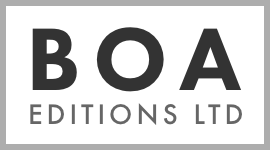
About This Title
jump the gun digs deep into the dark undercurrents of grief and gun violence that shadow our daily lives in America. These poems uproot the hidden recesses of life, the stages and struggles of womanhood, and our continual fight against violence, both internal and external, in the U.S. today.
The speaker in these poems wrestles with the everyday fears and realities we often try to ignore: the complex expectations placed on young girls and mothers alike, the illusion of childhood innocence, and the very real consequences of our environmental destruction.
Split into two sections—with poems that layer blood-soaked images between close-ups of the body and domestic life—this collection deftly illustrates the beauty that can be found in tragedy, the fragility of the natural world, and the resilience of the human relationships that fill it.
To read jump the gun is to witness yourself through the crosshairs. In Malboeuf’s words, “What hit you has become you. / Pieces of the bullet embedded / in your skin. Even / that which you come from / will never be the same. / But from violence comes / the tides, the seasons.”
Etymology of Gun
Someone handed me a gun and I hid it in a closet.
A millennium ago, a canon was made to fit in a fist.
Bamboo packed with powder in a hunt for immortality.
And then, in our time, a man—from a country Godless
and cold that gave this easy weapon a name—shot
more people than any one on earth. The word gun means
war not survival, is rooted in a feminine name that repeats:
war war like an echo, a ringing in the ear. In the armed forces,
soldiers are told to name their rifles, to love them, own them.
The worst shooting in America for sixteen years was at the Luby’s
in Killeen, Texas. He hated women. One of his victims wanted
more guns after he felled both her parents and failed to end her.
Man has always found a way to kill himself, turn a weed flower
into a gun instead of a crown. My mother first lived in a shotgun
house: all the bedrooms on one side of the building, safely tucked
away. The story was you could get a clean line from one end
to the other—front door to back—a bullet entering the home
without obstacle.
Praise for jump the gun
“jump the gun is made of sharp and beautiful poems. There is a striking fullness to the lives, experiences, and landscapes within these pages, all told with arresting clarity—‘Enough of mirrors. They are water,’ Jennie Malboeuf writes. As incisive as it is lyrical, as vast as it is intimate, this book is a force.” —Chloe Honum, author of The Lantern Room
“Jennie Malboeuf’s and jump the gun is a book of temporal distortions, sudden jumps, hesitations, and slowed and sped up lines, that take the reader through a complex of registers circling gun culture, violence, family, and the natural world in often startling juxtapositions. It’s a formally thrilling collection, even as the content moves from lyrically beautiful to starkly brutal. ‘I’m so tired of the pattern of snow then rain. Irony after irony, your / suffering then mine handed / back and forth,’ Malboeuf writes, and I feel that tension, that inevitable ‘back and forth’ throughout the book, the closely observed violences enacted daily, directly presented, forcing us to look at ourselves, this world we’ve made. But even at its most unflinchingly conflicted, with ‘The father in father clothes. / The mother in mother hair,’ it’s filled with empathy, as this imperative to look, to remember, to see the world’s violence and misfortune, is also to remind ourselves that it’s also filled with creation, continuance. It’s a deeply humane book, one I’ve been utterly captivated by.” —John Gallaher, author of Brand New Spacesuit

